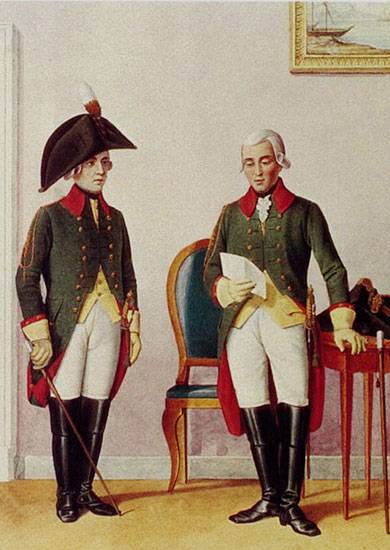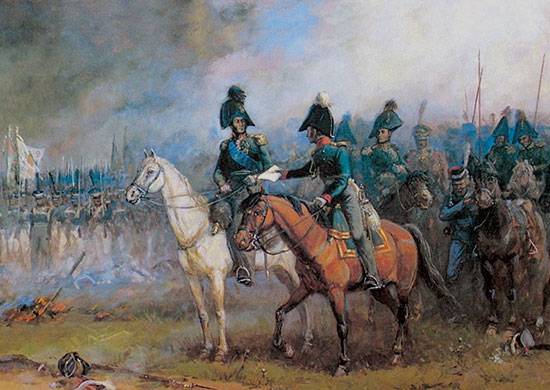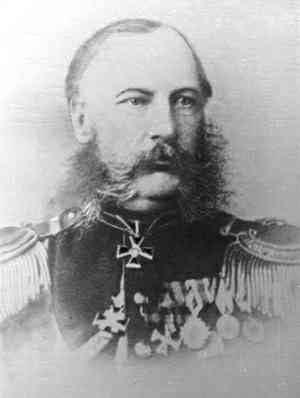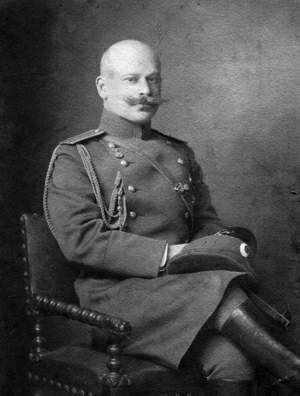Day courier service. The history of "mail of special importance"
The State Courier Service of the Russian Federation was established on January 24 on the basis of the Federal Office of Courier Communication under the Ministry of Communications of the Russian Federation. However, in fact, story courier service in Russia has more than one century. 17 December 1796, at the highest order of the Russian Emperor Paul I, the Courier Corps was established in the Russian Empire.
The German word "Feldjäger" is translated as "Field Arrow". In Prussia, feldégheri appeared in 1742 year and served as the military police - field gendarmerie. However, in the Russian Empire, courier service was from the very beginning focused on completely different tasks - the delivery of government and military correspondence. This task required a special approach to ensuring not only the fastest possible delivery, but also the security of cargo or correspondence. Therefore, the courier was different from the usual postal service and organizational structure, and requirements for them.
Since it was originally assumed that the courier would be engaged in delivering the orders and letters of the emperor to the highest military commanders and civilian officials, the number of the guard corps was insignificant - the number of attendants and the commander were only 13. The non-commissioned officer of the Preobrazhensky regiment Shelganin, who was promoted to army army captain, was appointed commander (recall that each rank in the guard was higher than in the army).
 The fact that the service in the Feldjegersky Corps was honorable from the very day it was founded was also indicated by the fact that the staff of the feldyegerey was recruited exclusively from members of the Guard regiments. Moreover, the main part of feldgegers at the early stage of the hull's existence were immigrants from the Cavalry Guard Regiment. In addition to the Horse Guards, non-commissioned officers of the Life Guards Izmailovsky, Preobrazhensky and Semenovsky Regiments were also taken to the corps. The number of the Feldjeger Corps began to grow almost immediately after creation. Already in the 1797 year, the 2 officer and 30 courier attendants served in the corps, in the 1800 year, the 4 chief officer and the 80 attendant courier. The growth in the number of feldjegers was explained by the further development of the state apparatus, the increase in its number, and the expansion of the borders of the Russian Empire.
The fact that the service in the Feldjegersky Corps was honorable from the very day it was founded was also indicated by the fact that the staff of the feldyegerey was recruited exclusively from members of the Guard regiments. Moreover, the main part of feldgegers at the early stage of the hull's existence were immigrants from the Cavalry Guard Regiment. In addition to the Horse Guards, non-commissioned officers of the Life Guards Izmailovsky, Preobrazhensky and Semenovsky Regiments were also taken to the corps. The number of the Feldjeger Corps began to grow almost immediately after creation. Already in the 1797 year, the 2 officer and 30 courier attendants served in the corps, in the 1800 year, the 4 chief officer and the 80 attendant courier. The growth in the number of feldjegers was explained by the further development of the state apparatus, the increase in its number, and the expansion of the borders of the Russian Empire. As the state strengthened, it was necessary to improve the “special mail” responsible for the transfer of letters, orders, and cargo of special, state importance. The courier corps, despite its very narrow focus, actually played an important role in Russian history. The feldjegers were involved in a huge number of key political events that had an epochal influence on Russian history.
From 1799 to 1814, Nikolai Kastorsky led the Courier Corps of the Russian Empire, taking up the post of corps commander with the rank of lieutenant and ending the service as lieutenant colonel. Kastorsky was a veteran of the Corps, who had served in him since its founding - first as an ordinary courier, then - from November 1798 - a second lieutenant. At the beginning of 1799, Lieutenant Kastorsky took command of the corps from Captain Shelganin. Thus, he became the second commander of the corps, but unlike Shelganin, who commanded the feldzhegers for a little more than two years, he stayed at the post of the main Russian cougars for the whole fifteen years. Despite the fact that Kastorsky began his service in the corps under Paul I, he retained his position under Emperor Alexander I. 5 in November 1802 of the year Kastorsky was given the rank of captain, and in 1805 the year of major.
In fact, it was Nikolai Kastorsky who was involved in the creation and development of a full-fledged courier corps in Russia. One of the main areas of work was the selection of personnel for the implementation of a not very romantic, but very responsible and necessary mission. In order to improve the management of the corps, in 1808, it was transferred to the Ministry of War. This led not only to an increase in internal discipline, but also to an improvement in the material situation of couriers, who had their salaries increased, and the officers had the privileges of army officers, for example, batmen were appointed.
An analysis of the orders that Major Kastorsky gave to the corps indicated that the commander had sought to maximize the level of discipline of courier. In particular, it was strictly forbidden to take passengers along the way, as the courier carried overvalued and secret correspondence, respectively - there should not have been situations that could entail such consequences as taking possession of correspondence or cargo by third parties. Those couriers who violated the order not to take passengers, were ordered to be demoted to the soldiers and sent to the troops. Interestingly, the corps officers, including its commander Kastorsky, took over the transportation of the most important letters and cargo. Another important requirement was a fast ride. It was strictly forbidden to go slowly, to make unreasonable stopovers on the way, on pain of severe punishment.
At this time, the requirements for candidates for the post of courier were also changed. If, at the beginning of the corps, the feldégiers were selected from the non-commissioned officers of the guards regiments, they now began to give preference to young employees who have experience in delivering correspondence. It could be both military couriers and civilian postmen, suitable for the presence of experience, their psychological qualities, physical fitness. The officers and officers of the corps were on duty in the imperial palace and could be sent with a variety of assignments throughout the country, as well as abroad. Since the corps and feldégheri officers could make long trips abroad, knowledge of foreign languages was considered a great plus for enrollment in the service.
Especially increased the need for coordinated work of couriers during wars or in the case of destabilization of the political situation in the country. The first one and a half decades of the reign of Alexander I were marked by numerous wars in which the Russian Empire took part. The employees of the Courier Corps also took part in all military conflicts. Before them were put very difficult tasks. Thus, the Patriotic War 1812 of the year did not go without couriers. The corps was responsible for the delivery of correspondence to the headquarters of the acting army and from the army headquarters to the palace, provided transportation of especially valuable cargoes. Therefore, it is safe to say that the contribution of courier service to the victory of the Russian weapons and the expulsion of the Napoleonic army from Russia was very serious.

During the faithful service and heroism of couriers during the World War 1812, Major Kastorsky was promoted to lieutenant colonel. It was a well-justified increase - and not only because Kastorsky served in the Major’s rank for seven years, but also because the corps commander personally participated in delivering secret correspondence to the army, and also carried out certain special assignments of Emperor Alexander I. For example, Lieutenant Colonel Kastorsky was responsible for the material and economic support of the launch of the balloon Leppih, with the help of which the Russian command hoped to bombard French troops with grenades. Unfortunately, the balloon tests did not end well, so he did not take part in the fighting.
It is possible that the lieutenant colonel of Kastorsky would have commanded the Courier Corps for many years, if in the 1814 year, at the age of 39 years, a sudden death did not interrupt the life of this worthy son of his Fatherland. In the history of the Russian courier communication, Lieutenant-Colonel Nikolai Yegorovich Kastorsky remained virtually as a “founding father,” since Captain Shelganin commanded the corps for just over two years and there was no any significant information about him and his activities.
Colonel Baron Bogdan Karlovich Tiesenhausen, who commanded the corps in 1814-1817, in contrast to Kastorsky, followed a different line in relations with his subordinates - he was not so much a “baty commander”, but a stern official chief, who enforced statutory orders. Nevertheless, the structure of the Courier Corps developed and strengthened under Tisenhausen, in particular, the corps was officially divided into three companies of couriers. Company commanders appointed experienced and disciplined officers who showed themselves well in service.
A separate page in the history of the Couples Corps was the uprising of the Decembrists. At this time, the corps was commanded by Major Mikhail Dmitrievich Vasilyev - a combat officer, a participant of the Patriotic War 1812 of the year and foreign campaigns of the Russian army in 1813-1814. In 1826-1827 It was the Feldjeger Corps that was charged with escorting political criminals to places of serving punishment in Siberia. During these years, almost all corps feldégiers were in constant travels, since the road to Siberia at that time was very long, and the Decembrists were not so short and had to alternately transfer them to distant places of detention. It was the courier who was responsible for transporting the convicted Decembrists, and the gendarmes were assigned to assist him in convoy. Naturally, transferring political criminals was a very difficult task, therefore the courier attendants were instructed not to take any programs for the Decembrists, to prevent communication with outsiders.
Throughout the nineteenth century, Russian couriers continued to perform important and dangerous tasks. The courier corps acted during all the wars waged by the Russian Empire in the 19th century. In spite of the fact that the service of feldgegers was not directly connected with participation in hostilities, from time to time the feldgegeri still fell under enemy attacks, suffered casualties - for example, in 1828, a lieutenant D.I died in battle at Shumle fortress. Sivkov. A medal in honor of the end in honor of the end of the Russian-Turkish war 1828-1829 was awarded to the 71 officer and corpsman. From 1832 to 1850, the Colonel Yakov Ivanovich Saks was the Commander-in-Chief of the Corps, a former military police officer and officer of the Life Guards Gendarme Regiment.
 At this time, the corps officers and feldъegeri repeatedly participated in the hostilities, including during the suppression of the Hungarian revolution of 1848-1849. For twenty years, from 1858 to 1878, the corps was commanded by Colonel Emil Martynovich Krause (pictured). Under his command, the strengthening and development of the courier service continued - a new number of corps was installed - 48 officers and 32 couriers, an increase in the salaries of officers and couriers.
At this time, the corps officers and feldъegeri repeatedly participated in the hostilities, including during the suppression of the Hungarian revolution of 1848-1849. For twenty years, from 1858 to 1878, the corps was commanded by Colonel Emil Martynovich Krause (pictured). Under his command, the strengthening and development of the courier service continued - a new number of corps was installed - 48 officers and 32 couriers, an increase in the salaries of officers and couriers.In the new era of the birth and rapid activation of the revolutionary movement in the country, the Courier Corps was part of the 1880s under the command of Colonel (then Major General) Karl Karlovich von Meyer. They began to make demands to the courageees to carefully inspect the correspondence that came to the Imperial Palace - in order to avoid sending bombs or poisonous substances in parcels. From von Meier and further on, the post of the head of the Courier Corps became a general.
 Major-General Alexander Dmitrievich Nosov (pictured), who headed the Courier Corps from 1909 to 1918 years, became the last commander of the courier of the Russian Empire. Interestingly, after the abolition of the Coupée Corps, he remained in the service, transferred to the Red Army, where he served as the head of the department in charge of the newly formed Red Army Corps of the Red Army.
Major-General Alexander Dmitrievich Nosov (pictured), who headed the Courier Corps from 1909 to 1918 years, became the last commander of the courier of the Russian Empire. Interestingly, after the abolition of the Coupée Corps, he remained in the service, transferred to the Red Army, where he served as the head of the department in charge of the newly formed Red Army Corps of the Red Army. The uniqueness of the Russian courier service is that it has experienced global political transformations in the life of the country. The management structure was changing, the commissariats of the people came to replace the ministries, the workers 'and peasants' militia replaced the police, the internal troops and state security bodies replaced the gendarmes, and the courier service remained. In Soviet times, the feldégheri continued to provide communications for party, state, and military leadership, and to carry out the tasks of transporting essential letters and cargo.
Modern Russian couriers derive from the glorious traditions of the Russian Empire's courier corps and similar services of the Soviet Union. Few are aware of the results of their service, but they exist and contribute to ensuring the national security of the country. The editorial staff of the Military Review congratulates all the employees and veterans of the courier communication on their professional holiday and wishes them successful and peaceful service.
Information